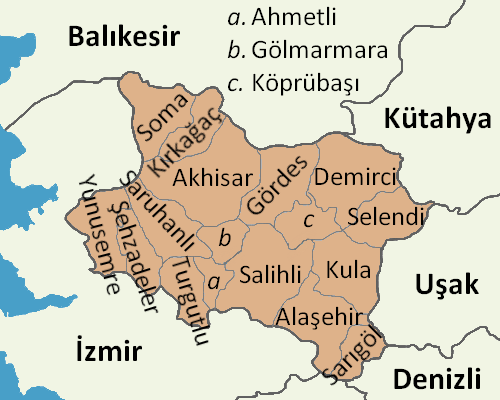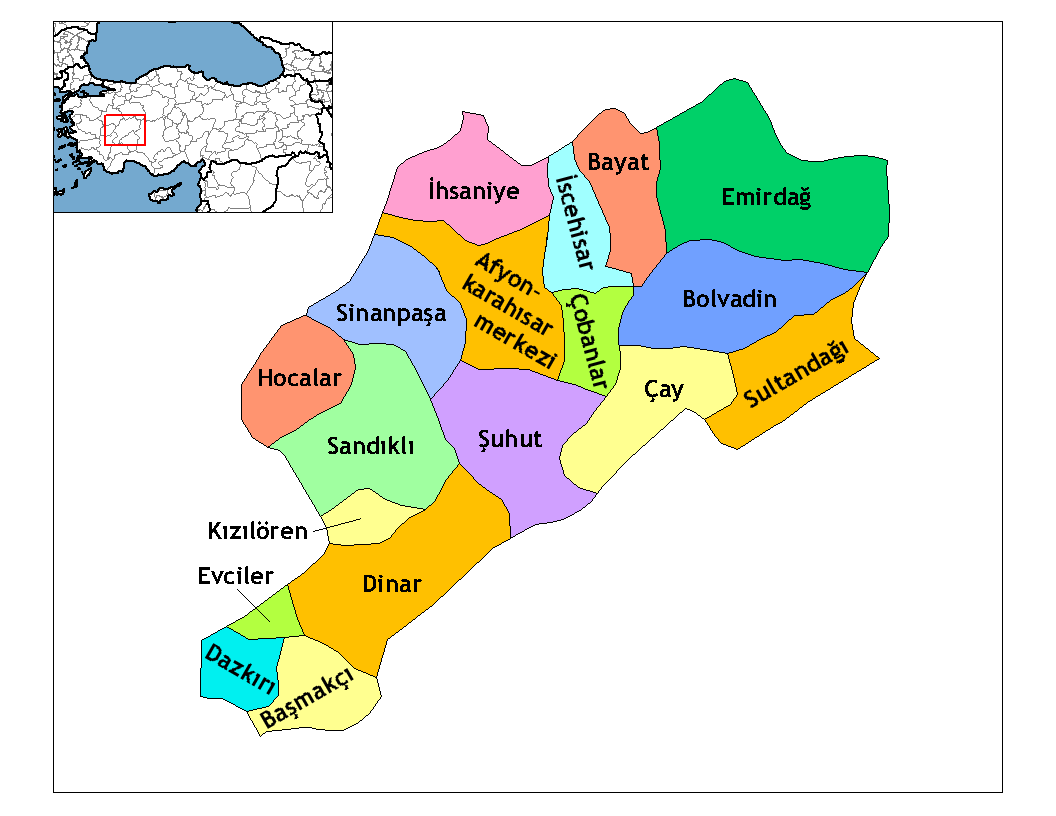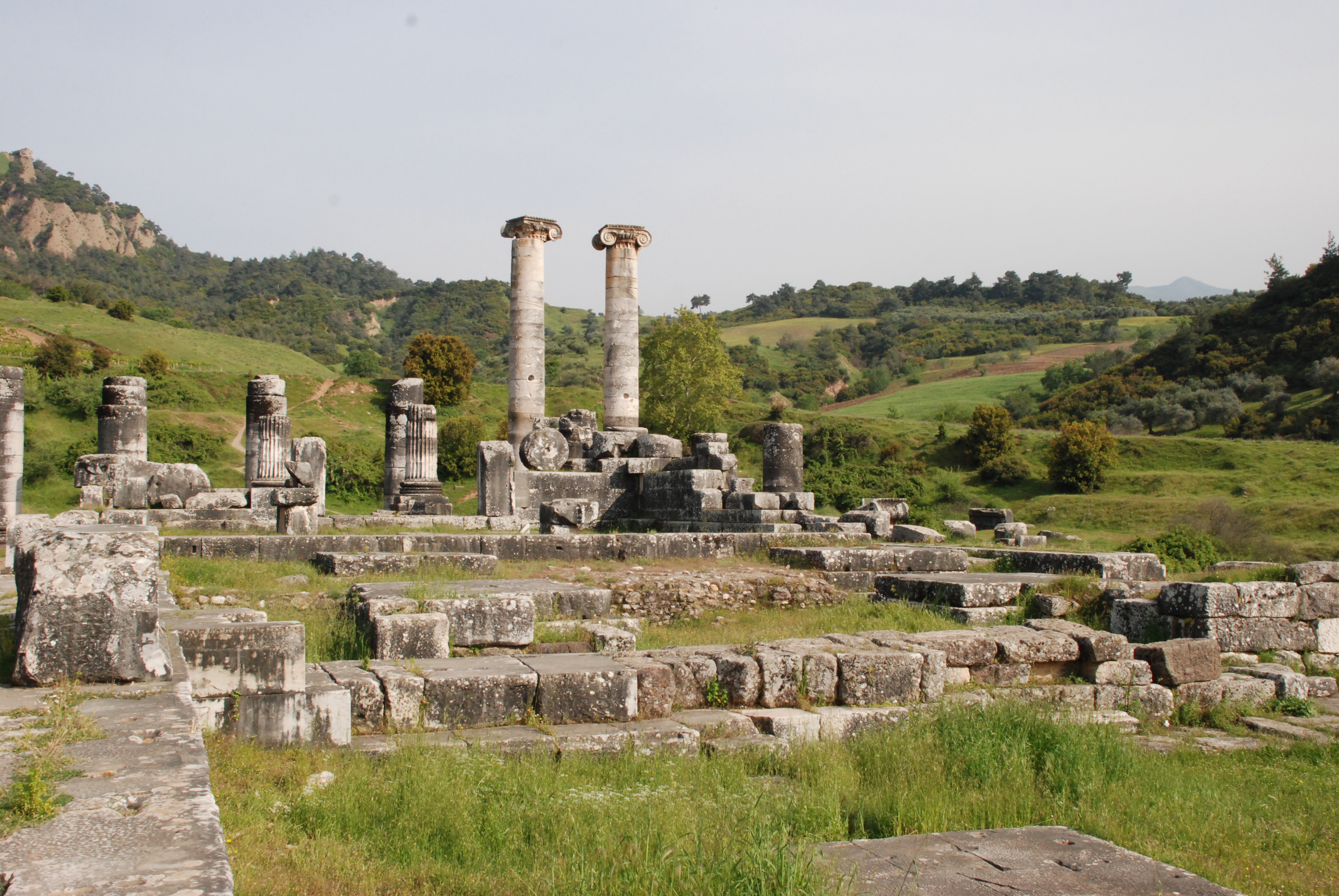|
Alaşehir
Alaşehir () is a municipality and district of Manisa Province, Turkey. Its area is 971 km2, and its population is 104,717 (2022). It is situated in the valley of the Kuzuçay ( Cogamus in antiquity), at the foot of the Bozdağ Mountain ( Mount Tmolus in antiquity). The town is connected to İzmir by a railway. Founded in antiquity as Philadelphia (, i.e., "the city of him who loves his brother"), the town was known as such until it was conquered by the Ottomans in 1390. Alaşehir stands on elevated ground commanding the extensive and fertile plain of the Gediz River ( Hermus in antiquity), presenting an imposing appearance when seen from a distance. It has about 45 mosques. There are small industries and a fair trade. From one of the mineral springs comes a heavily charged water popular around Turkey. Within Turkey, the city's name is synonymous with the dried Sultana raisins, although cultivation for the fresh fruit market, less labour-intensive than the dried fruit, ... [...More Info...] [...Related Items...] OR: [Wikipedia] [Google] [Baidu] |
Fall Of Philadelphia
The fall of Philadelphia in 1390 marked the conquest of the last independent Christian Greek settlement in western Asia Minor to the Muslim Ottomans of the Ottoman Empire. The city, now named Alaşehir, had been subject to a siege by the Turkish forces. Ironically, the besieging army included a contingent from the Byzantine Empire, which had become an Ottoman vassal state.Berger, Albrecht, �Alaşehir��, in: ''Encyclopaedia of Islam, Three'', Ed. Kate Fleet, et al. After the capture of Nicomedia by the Ottomans in 1337, the city of Philadelphia was the last city in Asia Minor that remained controlled by the Byzantine Empire for several decades. Prior to its fall, the city had evaded the fate of other Greek cities by its remote location up in the Lydian hills, its strong fortifications and its paying of tribute to the numerous Muslim ghazis, whose bands robbed and pillaged any Christians in Anatolia who did not pay protection money (''jizya''). Although the city was not official ... [...More Info...] [...Related Items...] OR: [Wikipedia] [Google] [Baidu] |
Manisa Province
Manisa Province () is a Provinces of Turkey, province and Metropolitan municipalities in Turkey, metropolitan municipality in western Turkey. Its area is 13,339 km2, and its population is 1,468,279 (2022). Its neighboring provinces are İzmir Province, İzmir to the west, Aydın Province, Aydın to the south, Denizli Province, Denizli to the southeast, Uşak Province, Uşak to the east, Kütahya Province, Kütahya to the northeast, and Balıkesir Province, Balıkesir to the north. The city of Manisa is the seat and capital of the province. The traffic code is 45. Districts Sites of interest Mount Sipylus List of national parks of Turkey, National Park (''Spil Dağı Milli Parkı'') near the city of Manisa embraces a richly forested area, hot springs, the famous "crying rock" of Niobe, and a Hittites, Hittite carving of the mother-goddess Cybele. The park boasts about 120 varieties of native plants within its boundaries, especially wild tulips. The park provides opportuni ... [...More Info...] [...Related Items...] OR: [Wikipedia] [Google] [Baidu] |
Districts Of Turkey
The Provinces of Turkey, 81 provinces of Turkey are divided into 973 districts (''ilçeler''; sing. ''ilçe''). In the Ottoman Empire and in the early Turkish Republic, the corresponding unit was the ''qadaa, kaza''. Most provinces bear the same name as their respective provincial capital (political), capital districts. However, many urban provinces, designated as greater municipalities, have a center consisting of multiple districts, such as the provincial capital of Ankara Province, Ankara province, Ankara, The City of Ankara, comprising nine separate districts. Additionally three provinces, Kocaeli, Sakarya, and Hatay have their capital district named differently from their province, as İzmit, Adapazarı, and Antakya respectively. A district may cover both rural and urban areas. In many provinces, one district of a province is designated the central district (''merkez ilçe'') from which the district is administered. The central district is administered by an appointed pr ... [...More Info...] [...Related Items...] OR: [Wikipedia] [Google] [Baidu] |
Lydia
Lydia (; ) was an Iron Age Monarchy, kingdom situated in western Anatolia, in modern-day Turkey. Later, it became an important province of the Achaemenid Empire and then the Roman Empire. Its capital was Sardis. At some point before 800 BC, the Lydian people achieved some sort of political cohesion, and existed as an independent kingdom by the 600s BC. At its greatest extent, during the 7th century BC, it covered all of western Anatolia. In 546 BC, it became a Lydia (satrapy), satrapy of the Achaemenid Empire, known as ''Sparda'' in Old Persian. In 133 BC, it became part of the Roman Republic, Roman Asia (Roman province), province of Asia. Lydian coins, made of electrum, are among the oldest in existence, dated to around the 7th century BC. Geography Lydia is generally located east of ancient Ionia in the modern western Turkish provinces of Uşak Province, Uşak, Manisa Province, Manisa and inland İzmir Province, İzmir.Rhodes, P.J. ''A History of the Classical Greek ... [...More Info...] [...Related Items...] OR: [Wikipedia] [Google] [Baidu] |
Flavian Dynasty
The Flavian dynasty, lasting from 69 to 96 CE, was the second dynastic line of emperors to rule the Roman Empire following the Julio-Claudian dynasty, Julio-Claudians, encompassing the reigns of Vespasian and his two sons, Titus and Domitian. The Flavians rose to power during the civil war of 69 CE, known as the Year of the Four Emperors; after Galba and Otho died in quick succession, Vitellius became emperor in mid 69. His claim to the throne was quickly challenged by Roman legion, legions stationed in the eastern provinces, who declared their commander Vespasian emperor in his place. The Second Battle of Bedriacum tilted the balance decisively in favor of the Flavian forces, who entered Rome on 20 December, and the following day, the Roman Senate officially declared Vespasian emperor, thus commencing the Flavian dynasty. Although the dynasty proved to be short-lived, several significant historic, economic and military events took place during their reign. The reign of Titus was ... [...More Info...] [...Related Items...] OR: [Wikipedia] [Google] [Baidu] |
Vespasian
Vespasian (; ; 17 November AD 9 – 23 June 79) was Roman emperor from 69 to 79. The last emperor to reign in the Year of the Four Emperors, he founded the Flavian dynasty, which ruled the Empire for 27 years. His fiscal reforms and consolidation of the empire brought political stability and a vast building program. Vespasian was the first emperor from an Equestrian (Roman), equestrian family who rose only later in his lifetime into the Roman Senate, senatorial rank as the first of his family to do so. He rose to prominence through military achievement: he served as legatus, legate of Legio II Augusta during the Roman invasion of Britain in 43, and later led the suppression of the First Jewish–Roman War, Jewish rebellion of 66–70. While he was engaged in the campaign in Judaea (Roman province), Judaea, Emperor Nero died by suicide in June 68, plunging Rome into a year of civil war known as the Year of the Four Emperors. After Galba and Otho perished in quick succession, V ... [...More Info...] [...Related Items...] OR: [Wikipedia] [Google] [Baidu] |
Claudius
Tiberius Claudius Caesar Augustus Germanicus ( ; ; 1 August 10 BC – 13 October AD 54), or Claudius, was a Roman emperor, ruling from AD 41 to 54. A member of the Julio-Claudian dynasty, Claudius was born to Nero Claudius Drusus, Drusus and Antonia Minor at Lugdunum in Roman Gaul, where his father was stationed as a military legate. He was the first Roman emperor to be born outside Roman Italy, Italy. As he had a limp and slight deafness due to an illness he suffered when young, he was ostracized by his family and was excluded from public office until his consulship (which was shared with his nephew, Caligula, in 37). Claudius's infirmity probably saved him from the fate of many other nobles during the purges throughout the reigns of Tiberius and Caligula, as potential enemies did not see him as a serious threat. His survival led to him being declared emperor by the Praetorian Guard after Caligula's assassination, at which point he was the last adult male of his family. Despite ... [...More Info...] [...Related Items...] OR: [Wikipedia] [Google] [Baidu] |
Caligula
Gaius Caesar Augustus Germanicus (31 August 12 – 24 January 41), also called Gaius and Caligula (), was Roman emperor from AD 37 until his assassination in 41. He was the son of the Roman general Germanicus and Augustus' granddaughter Agrippina the Elder, members of the Julio-Claudian dynasty, first ruling family of the Roman Empire. He was born two years before Tiberius became emperor. Gaius accompanied his father, mother and siblings on campaign in Germania, at little more than four or five years old. He had been named after Gaius Julius Caesar, but his father's soldiers affectionately nicknamed him "Caligula" ('little boot'). Germanicus died in Antioch in 19, and Agrippina returned with her six children to Rome, where she became entangled in a bitter feud with Emperor Tiberius, who was Germanicus' biological uncle and adoptive father. The conflict eventually led to the destruction of her family, with Caligula as the sole male survivor. In 26, Tiberius withdrew from pub ... [...More Info...] [...Related Items...] OR: [Wikipedia] [Google] [Baidu] |
List Of Roman Emperors
The Roman emperors were the rulers of the Roman Empire from the granting of the name and title ''Augustus'' to Octavian by the Roman Senate in 27 BC onward. Augustus maintained a facade of Republican rule, rejecting monarchical titles but calling himself '' princeps senatus'' (first man of the Senate) and ''princeps civitatis'' (first citizen of the state). The title of Augustus was conferred on his successors to the imperial position, and emperors gradually grew more monarchical and authoritarian. The style of government instituted by Augustus is called the Principate and continued until the late third or early fourth century. The modern word "emperor" derives from the title '' imperator'', that was granted by an army to a successful general; during the initial phase of the empire, the title was generally used only by the ''princeps''. For example, Augustus's official name was ''Imperator Caesar Divi Filius Augustus''. The territory under command of the emperor had develop ... [...More Info...] [...Related Items...] OR: [Wikipedia] [Google] [Baidu] |
Roman Empire
The Roman Empire ruled the Mediterranean and much of Europe, Western Asia and North Africa. The Roman people, Romans conquered most of this during the Roman Republic, Republic, and it was ruled by emperors following Octavian's assumption of effective sole rule in 27 BC. The Western Roman Empire, western empire collapsed in 476 AD, but the Byzantine Empire, eastern empire lasted until the fall of Constantinople in 1453. By 100 BC, the city of Rome had expanded its rule from the Italian peninsula to most of the Mediterranean Sea, Mediterranean and beyond. However, it was severely destabilised by List of Roman civil wars and revolts, civil wars and political conflicts, which culminated in the Wars of Augustus, victory of Octavian over Mark Antony and Cleopatra at the Battle of Actium in 31 BC, and the subsequent conquest of the Ptolemaic Kingdom in Egypt. In 27 BC, the Roman Senate granted Octavian overarching military power () and the new title of ''Augustus (title), Augustus'' ... [...More Info...] [...Related Items...] OR: [Wikipedia] [Google] [Baidu] |
Kingdom Of Pergamon
The Kingdom of Pergamon, Pergamene Kingdom, or Attalid kingdom was a Greek state during the Hellenistic period that ruled much of the Western part of Asia Minor from its capital city of Pergamon. It was ruled by the Attalid dynasty (; ). The kingdom was a rump state that was created from the territory ruled by Lysimachus, a general of Alexander the Great. Philetaerus, one of Lysimachus' lieutenants, rebelled and took the city of Pergamon and its environs with him; Lysimachus died soon after in 281 BC. The new kingdom was initially in a vassal-like relationship of nominal fealty to the Seleucid Empire, but exercised considerable autonomy and soon became entirely independent. It was a monarchy ruled by Philetaerus's extended family and their descendants. It lasted around 150 years before being eventually absorbed by the Roman Republic during the period from 133–129 BC. History From autonomy to independence (282–241 BC) Philetaerus rose from humble origins to ... [...More Info...] [...Related Items...] OR: [Wikipedia] [Google] [Baidu] |
Attalus II Philadelphus
Attalus II Philadelphus (Greek: Ἄτταλος ὁ Φιλάδελφος, ''Attalos II Philadelphos'', which means "Attalus the brother-loving"; 220–138 BC) was a ruler of the Attalid kingdom of Pergamon and the founder of the city of Attalia. Family He was the second son of Attalus I Soter and queen Apollonis of Cyzicus, and ascended the throne first as co-ruler alongside his ailing brother Eumenes II in 160 BC, whose widow Stratonice of Pergamon he married in 158 BC upon Eumenes' death.Strabo13.4.2 Hansen, pp. 44–45; Hurwit, p. 271. Biography Prior to becoming king, Attalus was already an accomplished military commander. In 192 BC he was sent by his brother Eumenes to Rome to warn against Antiochus III. In 190 BC, he was present in the Battle of Magnesia which resulted in a defeat against the Seleucids. Around 189 BC he led his forces to fight alongside the Roman Army under Gnaeus Manlius Vulso in Galatia. From 182-179 BC, he successfully defeated the Kin ... [...More Info...] [...Related Items...] OR: [Wikipedia] [Google] [Baidu] |









